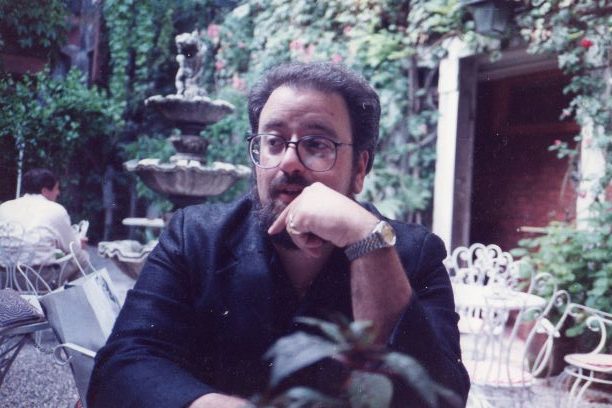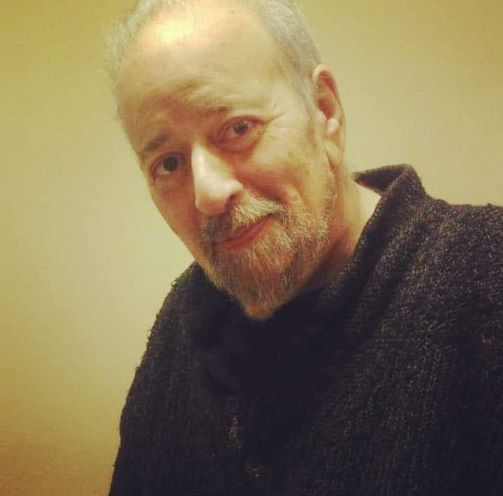The greatest sorrow of my life
by Maximilian Eyle
On Tuesday March 17th, Nicolas Eyle passed away at his home, (his favorite place), and I was with him at the end. Many of you  already know that he had been dealing with a severe cancer diagnosis which we received in early September of last year. Through much of that time he had been able to maintain most of his usual routines – attending local tango events, playing trivia downtown at Al’s on Monday nights, and going to hear as much live music as much as his energy would allow. As time went on, these became more and more challenging and the last few weeks were spent primarily at home. Losing him will likely be the greatest sorrow of my life, but I am glad that he doesn’t have to suffer any more.
already know that he had been dealing with a severe cancer diagnosis which we received in early September of last year. Through much of that time he had been able to maintain most of his usual routines – attending local tango events, playing trivia downtown at Al’s on Monday nights, and going to hear as much live music as much as his energy would allow. As time went on, these became more and more challenging and the last few weeks were spent primarily at home. Losing him will likely be the greatest sorrow of my life, but I am glad that he doesn’t have to suffer any more.
My dad was a strong individualist with firm beliefs about how life should be lived – beliefs that he never strayed from even at the very end. His views were largely unshakable, and he was completely unafraid to tell you what he thought, no matter how unpopular the opinion or delicate the subject. Yet one of the most beautiful ironies of his life was that a man with such an unshakable nature was able to build a spectacularly diverse community of friends, colleagues, and acquaintances from all walks of life. Rather than isolating him, his raw confidence enabled him to remain at ease in many types of settings, and with many types of people. He was as comfortable drinking vintage Bordeaux and discussing politics at a black tie event as he was smoking a joint and discussing blues guitar in the back patio of a south side dive bar. This awareness and appreciation that beauty and value can be found in all walks of life was one of the greatest lessons he ever taught me.
There is little doubt that much of his personality and attitude came from being born and raised in Manhattan – an identity he always maintained despite spending most of his adult life in Upstate New York. He was born in 1949 to European immigrants and was the first in his family to be born in the United States. His father, Felix Eyle, was a professional violinist from Poland and was the concertmaster of the Metropolitan Opera at the time my dad was born. His mother, Lisl, was a Viennese beauty who narrowly escaped the Nazis by fleeing to England with her family. Shortly thereafter, she married Felix and moved to America.
My dad became fascinated by photography during his teenage years and pursued it aggressively, spending time working as an apprentice before going into business on his own. Over the span of his career, he primarily did corporate work for advertisements and annual reports. Some notable exceptions include portraits he took of Lauren Bacall and Alexander Kerensky.
In the early 1970s, my dad and some other artistically inclined friends submitted a proposal to turn the long-abandoned Earlville Opera House into an arts center. Their idea was approved, so they left Manhattan, and spent the next few years in Earlville, NY renovating the old opera house and eventually using the space to teach videography, photography, dance, and more. The Earlville Opera House continues to exist to this day, providing a broad range of cultural and artistic content to their community.
His work in photography eventually led him to Syracuse in the late ‘70s where he met my mother, Alexandra Eyle. They got married in 1986 and in 1992, I was born. Around that time, the art of film photography that my dad loved so much began to be replaced by digital technology and he left the business entirely.
In a remarkable career shift, he decided to pursue political activism full time and joined several other like-minded friends in forming ReconsiDer: Forum on Drug Policy, a nonprofit organization dedicated to ending the War on Drugs in favor of legalization, regulation, and a more compassionate and evidence based criminal justice system. Topics like marijuana legalization, syringe access for people who inject drugs, and Safe Injection Sites were all measures that they advocated for as early as 25 years ago – long before they were being discussed seriously by mainstream political candidates as they are today.
The work my father did in the field of drug policy was some of his proudest, and it remained the subject that he spoke most passionately about for the rest of his life. The idea that people continue to be incarcerated for voluntarily putting a substance into their bodies always struck him as the height of absurdity. If my dad had a single mantra it would likely be: “Prohibition doesn’t work.”
Despite having only a high school diploma and entering the public policy arena when he was already in his mid-40s, he became nationally recognized in the field. The public hearings that he organized in Syracuse back in 2004 to investigate city spending on the enforcement of drug laws were the first of their kind ever held in the United States. In the early 2000s, he served for eight years on the New York City Bar Association’s Committee on Drugs and the Law, (despite not being a lawyer), during which time he authored several papers examining international drug treaties and law enforcement’s involvement in U.S. drug policy. His name, his organization, and their impact are listed in the Encyclopedia of Drug Policy.
For the final 20 years of his life, Argentine tango was one of his greatest passions and interests. He first encountered it after joining some neighbors to participate in free lessons being offered downtown. On a whim, he accepted and quickly fell in love with the dance. Over time, members of that community became some of his closest friends and he grew to become the leader and primary organizer of the Syracuse tango community. His enthusiasm for the art form and its history was contagious, and he never tired of inventing new ways to reinvigorate our local dance scene and convince new people to come and give it a try. It is a certainty that tango brought him many of his happiest moments and introduced him to some of his closest friends.
 My dad was never a fan of funerals, and always loved the idea of the New Orleans style remembrance with a limited time for grieving and a big party right afterwards. With the current quarantine going on, any real gathering is impossible for now. Hopefully sometime down the road this will change and a celebration of his life can be organized. My dad was a staunch atheist even during his most difficult moments at the end. He embraced and found comfort in the idea of life simply ending at a certain point. As he put it, “Who would want to sprout wings and bounce around on clouds for eternity anyway?” His greatest hope was that a productive use could be found for his remains. For that reason, we decided to donate his body to science via the Anatomical Gift program at Upstate.
My dad was never a fan of funerals, and always loved the idea of the New Orleans style remembrance with a limited time for grieving and a big party right afterwards. With the current quarantine going on, any real gathering is impossible for now. Hopefully sometime down the road this will change and a celebration of his life can be organized. My dad was a staunch atheist even during his most difficult moments at the end. He embraced and found comfort in the idea of life simply ending at a certain point. As he put it, “Who would want to sprout wings and bounce around on clouds for eternity anyway?” His greatest hope was that a productive use could be found for his remains. For that reason, we decided to donate his body to science via the Anatomical Gift program at Upstate.
